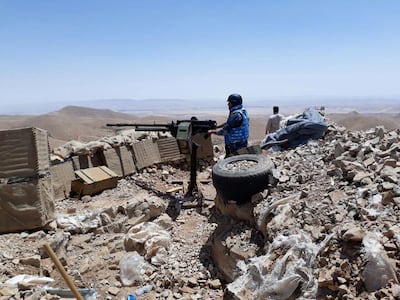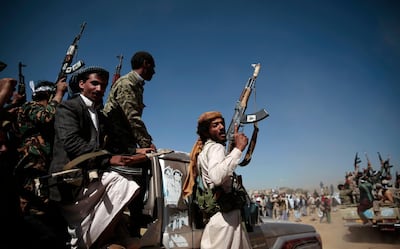Last weekend, the US State Department issued a $10 million reward for information on Mohammad Kawtharani, a senior Hezbollah figure based in Iraq. This is not the first time that Kawtharani has landed on the radar of the Americans. In fact, he was added to the US terror list in 2013. But why is he now worth $10m?
The answer lies in Hezbollah’s growing ambitions in Iraq and abroad, and a shift in its influence and role from a sister proxy of the Iranian regime to a mediator of sorts, at a time when the rule of Tehran is under fire both domestically and in the region.
Kawtharani is believed to have been close to Qassem Suleimani, the slain commander of Iran’s Quds Force, an elite military branch of the regime responsible for managing pro-Iranian groups abroad and carrying out external operations. Kawtharani has also played a role in sending Iraqi militiamen to fight for Bashar Al Assad’s regime in Syria.
As Hezbollah's representative in Iraq, he has also come to assume the unofficial role of co-ordinator for the country's many Iran-aligned militias following the demise of Suleimani. This January, Suleimani was killed in a US airstrike in Baghdad along with Abu Mahdi Al Muhandis, the former head of Kataib Hezbollah, one of the many Tehran-backed militias united under the umbrella of the Popular Mobilisation Forces, which he also co-headed.
With two major figures once responsible for the consolidation of Tehran's grip on Iraq now gone, a power vacuum had set in – although Esmail Qaani had been appointed Sulaimani's successor. And even as the PMF's militias jostled for power, Moqtada Al Sadr – whose Sairoon coalition is the largest bloc in parliament, faced off with authorities and other pro-Iranian groups for dominance in Iraqi politics. This is when Hezbollah stepped in to offer guidance. The group has had ties to Iraq's Iranian proxies for decades, going back to the days of Saddam Hussein's rule.

Shortly after Suleimani's killings, Hezbollah's representatives met with Iraqi militia leaders in a bid to unite their ranks. The end goal was to nominate a prime minister capable of putting together a cabinet agreeable to their Iranian patrons and at the same time capable of assuaging the concerns of Iraq's youth, who had been protesting against institutional corruption, Tehran's grip on the country and the rule of militias, since October. Hundreds of unarmed civilians have lost their lives in a bid to push out corrupted politicians. And even Mr Al Sadr, who had initially aligned himself with the protesters, began siding with Tehran and taking up arms against the protesters.
Hezbollah seemed ideally positioned to guide Iraq’s fractious militias through what is essentially a contradictory process. After all, the group has succeeded to quell, at least in part, Lebanon’s own protest movement that began 17 days after Iraq’s "October Revolution." These include the end of sectarian rule, widespread corruption and deteriorating standards of living.
Contrary to its Iraqi counterparts, Hezbollah can count on its image for being "incorruptible", an advantage in its dealings at home and abroad. Despite being listed as a terrorist organisation by the US, the Arab League and many European countries, the group maintains an aura of respectability, and even sanctity, with an influence beyond its traditional base of religious Shias. This is due in large part to the group’s claim of being a resistance movement and its success in liberating Lebanon’s south from Israeli occupation – although others also took part in the fight.
Hezbollah's Secretary-General Hassan Nasrallah also plays an important role in honing this image of sanctity. A clergyman claimed to be a descendant of Prophet Mohammed, his hours-long televised speeches can captivate an entranced audience from beginning to end. In fact, even as protesters rose up against Amal – the group’s only competitor within Lebanon's Shia community – in the early days of demonstrations, Hezbollah dodged overt condemnation in Shiite heartlands. It is unclear whether this silence was a result of the public's respect for the group or its fear of it.
Either way, Hezbollah's image has helped it to extend its reach beyond its borders. Its allure is striking not just in Syria but also in faraway Yemen. Reports suggest that the Houthi rebels there have received military training and advice from Hezbollah. Within just two years, the Houthis have reportedly raised nearly $1 million for the group through Ramadan fundraisers and radio campaigns, at a time when 80 per cent of Yemenis rely on aid to make ends meet. The rebels have even gone as far as mimicking its logo, albeit using different colours.
In addition to Hezbollah's reputation, cohesiveness and durability – the organisation is the Iranian regime’s oldest proxy – it can also count on the support of an international network of financiers dealing in drug-trafficking and money-laundering schemes from sub-Saharan Africa to Latin America’s Tri-Border Area. Some of Lebanon’s banks, such as the now-defunct Lebanese Canadian Bank and Jammal Trust Bank, have also been involved in funneling money to the group and its allies, allowing it to evade US sanctions.
This track record has allowed the group to become Tehran’s most trusted ally, one that can co-ordinate its external operations in times of strife and, essentially, play the same role as the Islamic Revolutionary Guard Corps, Iran's paramilitary volunteer militia of which Quds Force is a part. However, Hezbollah’s growing influence points not to Tehran’s increased hold over the region but to its mounting challenges at home and faltering leadership abroad.
Hezbollah itself is dealing with upheaval at home. Amid the coronavirus pandemic, protests have no doubt come to a halt in Iraq and Lebanon. But the group will, in all likelihood, continue to face challenges to its legitimacy as people return to the streets. And with a price tag now on one of its senior leaders abroad, Hezbollah's Iranian patron is running out of options to keep its other proxies within its grasp.
Aya Iskandarani is a staff Comment writer at The National




